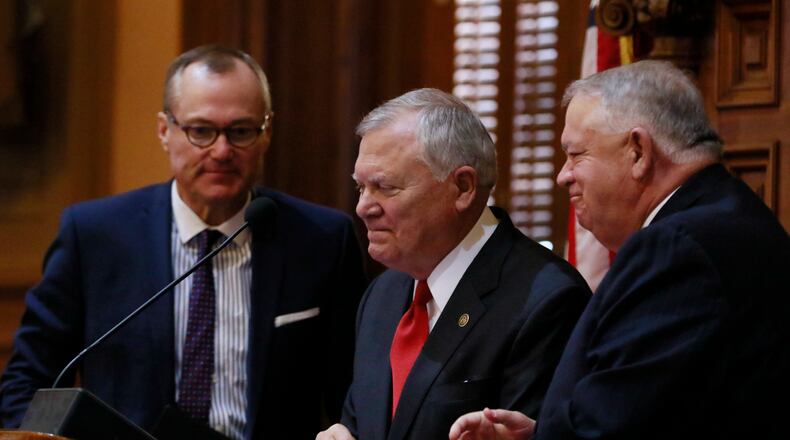Gov. Nathan Deal has formally abandoned his campaign pledge to rewrite the state's outdated school funding formula, saying in an interview "there were too many other things that were important that we felt like we could achieve."
The task of making vast changes to the formula has overwhelmed many governors before him, regardless of party. Almost every governor has criticized the Quality Basic Education Act’s calculus since it was created in 1985. Yet none has proved capable of overhauling it.
You can find a story on what the failure to overhaul the formula means to school systems right here. But what's clear is it will be left to the candidates for governor whether to revisit the aging rubric that's used to distribute more than $9 billion to schools.
So will Deal’s QBE tangle be a cautionary tale? Here’s how a few of the candidates would tackle the debate.
Democrat Stacey Abrams:
The former Georgia House Democratic leader slammed state leaders for “draconian austerity cuts for more than a decade that harmed students and gutted our schools” and said she would “fully fund” the formula if elected.
"To this end, we must adopt a more comprehensive education funding formula that directly addresses the inescapable correlation between poverty and educational outcomes; supports educators as they seek to best serve our students; and invests in access to the technology that is an essential part of learning in the 21st century but remains out of reach for too many of our kids."
Republican Casey Cagle:
The lieutenant governor wrote in “Education Unleashed” that giving school systems more flexibility - and not rewriting the formula - is the ticket to improved K-12 education.
“I do not believe that our greatest challenge in improving our public education system is merely a matter of adjusting overall funding or configuring a new formula to give more money to schools to implement new programs,” he wrote.
“Rather, our most significant obstacle is to reform our status quo operations by questioning how we think about public education in Georgia and returning as much authority as possible back to school districts so they can allocate more funding back to individual schools, giving them flexibility to use those funds to serve the needs of individual students.”
Democrat Stacey Evans:
The former state lawmaker called the spending formula “too low a benchmark” and said it doesn’t meet the growing needs of Georgia students.
“Any overhaul to the funding formula should include, at a minimum, adjustments for inflation so the formula keeps up with actual costs, a halt to cost-shifting, and increased funding for students, schools and districts with greater needs. Some schools and children are struggling more than others, and we should direct our resources where they are needed most.”
Republican Brian Kemp:
The secretary of state has made updating the formula a key part of his education platform.
"I am the only candidate for governor who has called for an update to the QBE formula and the only one with a plan to put students - not the status quo - first. By enhancing local control and letting state dollars follow the student, we can improve educational outcomes and ensure a bright future for Georgia."
Republican Hunter Hill:
The former state senator calls for “student-centered” redesign — and worries that without it k-12 education will “hold us back from being a better state.”
“The arguments and fights against a reform are coming from the education establishment. We need to have an equitable system that puts students and families first,” he said. “If it were easy, it would have already been done.”
About the Author
The Latest
Featured




